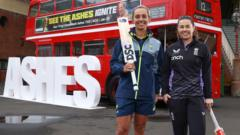Media caption, ‘You get sledged at breakfast’ – Knight wants England to stick together
Ffion Wynne
BBC Sport Journalist in Sydney
A lot has changed in the decade since England’s women last held the Ashes trophy.
There have been six different prime ministers in the UK, Brexit, a global pandemic and three Olympic Games, and women’s cricket is now unrecognisable from the days when professionalism was embryonic.
England and Australia are now leading the way with professional set-ups at both international and domestic level, which usually results in gripping contests between the two, but it’s this year’s hosts who have the bragging rights in terms of silverware.
Alyssa Healy’s world-dominating side hold the 50-over World Cup, the Ashes since 2014 and only last year relinquished their T20 crown for the first time since 2018. They are arguably sport’s most successful and dominant team in recent years.
England’s trophy cabinet looks very different, having not won a World Cup since the triumph at Lord’s in 2017.
But the home Ashes series in 2023 was drawn overall when Australia were strong favourites, and Heather Knight’s side dominated the white-ball leg with two series wins, an achievement very few teams have managed.
The disappointment in the Australian camp when they were presented the Ashes trophy by default because of the draw was visible, which will give England a huge boost and sets up an intriguing contest between the sides ranked numbers one and two in the world.
“It is guaranteed to be exciting – both teams are probably the most equal they have been for the past 15 years in terms of talent and potential,” said ex-England bowler Alex Hartley.
“Last time, England proved they are as good as Australia which we weren’t expecting.”
Here’s everything you need to know as England attempt to bring the urn home, starting with Sunday’s first one-day international (23: 30 GMT, Saturday).
What is the format of the Women’s Ashes and how can I follow?
Media caption, Women’s Ashes format explained
The series consists of three one-day internationals, three T20s and concludes with a day-night Test at the Melbourne Cricket Ground, with each white-ball game worth two points and the Test match worth four.
That presents the prospect of a compelling series in terms of how both teams approach the Test if the series is still alive, or if one team needs to force a result in order to win the overall points tally.
It is also a particularly gruelling schedule, the shortest ever in terms of days, with the teams having to contend with the geographical challenge of navigating Australia during a short turnaround between matches.
“There’s no doubt it’s tough but it’s the sam
Read More





